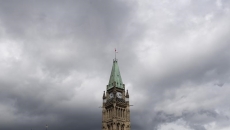British Columbia's seniors advocate is asking the province to designate one person as an essential visitor for every long-term care resident as the facilities move to stem the spread of COVID-19.
Isobel Mackenzie says in a news release that the need to limit visitors has left a majority of long-term care residents without visits from loved ones.
The province announced last week that visits to long-term care and assisted living facilities would be limited to essential visitors in response to the fast-spreading Omicron variant and would be re-evaluated Jan. 18.
Mackenzie says the process for determining if a resident meets the criteria to have a designated essential visitor is made by the administrator of the facility on a case-by-case basis.
She says essential visitors often give vital support care to seniors, especially as these places face staff absences of up to 30 per cent because of COVID-19.
Provincial health officer Dr. Bonnie Henry agreed during her weekly briefing on Tuesday that visitors in care homes are essential, saying that once rapid tests are deployed in each facility, they'll go back to allowing every resident to have a designated social visitor and an essential visitor.
The federal government said Wednesday that it would be distributing 140 million rapid tests to provinces and territories this month.
A recommendation made by the Office of the Seniors Advocate in November 2020 said all residents must be provided the opportunity to designate an essential visitor.
MacKenzie says her office has received calls from family members, including spouses, who say they can no longer visit, even though they are helping care for the senior.
"They help to feed their loved one, get them dressed, take them for walks, and keep them engaged," she says.
"For many residents, these visitors are the only people who can motivate them to engage in any activities, and yet they are not formally recognized as essential."






